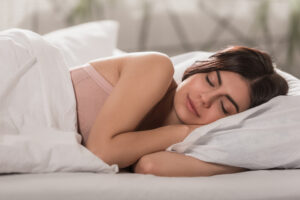September 07, 2020 | Black & Kletz Allergy

Sleep apnea may be classified as either “obstructive sleep apnea” or “central sleep apnea.” The severity is categorized into 3 classifications: mild, moderate, and severe. The severity is based on the number of episodes or events of apnea (i.e., complete stoppage of breathing for at least 10 seconds) or hypopnea (i.e., shallow breaths for at least 10 seconds) that occur per hour of sleep. Sleep apnea is deemed “mild” when there are 5-14 episodes of apnea or hypopnea per hour. It is considered “moderate” when there are 15-29 episodes of apnea or hypopnea per hour. Likewise, it is called “severe” when there are 30 or more episodes of apnea or hypopnea per hour. In obstructive sleep apnea, the breathing is obstructed by the blockage of air flow. It is often caused by the tongue sliding back in the throat, in combination with a relaxed airway which changes shape to a more oval shape which gives way to less room for air to be able to get to infiltrate the lungs from the nose or mouth. In a sense, the muscles of the throat relax and fail to hold the airway open during sleep. In central sleep apnea, the normal unconscious breathing simply stops, usually due to the brain not sending the normal signals to the muscles that control breathing. Central sleep apnea is much less common than the obstructive variety and not associated with allergies, so we will only be discussing obstructive sleep apnea in this blog article.
Individuals with allergic rhinitis (i.e., hay fever) have worse sleep apnea overall than those without allergic rhinitis. The apnea episodes are more frequent and longer in duration. Allergic rhinitis is also a risk factor for snoring. Snoring is one of the most common findings in individuals with sleep apnea. Individuals with allergic rhinitis often have nasal congestion which causes the upper airway to narrow. Individuals with hay fever also are more prone to sinus infections. Most individuals with sinus infections also have concurrent nasal congestion as part of their symptoms. The upper airway narrowing that occurs due to nasal congestion in allergic individuals increases the likelihood of snoring and obstructive sleep apnea. Some other risk factors for obstructive sleep apnea include obesity, large neck circumference, enlarged tonsils, deviated septum, males, age over 40, and gastroesophageal reflux (GERD).
The gold standard for the diagnosis of sleep apnea is an overnight sleep study. Allergy testing by allergy skin tests or blood tests are performed by a board certified allergist like the ones at Black & Kletz Allergy in order to identify potential allergens that are causing their allergic rhinitis symptoms (e.g., nasal congestion, runny nose, post-nasal drip, itchy nose, sneezing, snoring, fatigue, itchy throat, itchy eyes, watery eyes, redness of the eyes, sinus pressure, sinus headaches).
The most effective treatment of obstructive sleep apnea is the use of CPAP (continuous positive airway pressure) while sleeping. CPAP machines are used to distribute a constant flow of pressure which in turn forces open the airway obstruction. CPAP can be delivered by the use of nasal pillows or prongs, a nasal mask, or a full face mask. The use of mouth or dental devices are controversial but may help alleviate symptoms in individuals with mild obstructive sleep apnea. Surgery can also be performed in order to improve obstructive sleep apnea, although it is also somewhat controversial in its efficacy. A uvulopalatopharyngoplasty is one of the most common surgical procedures for treating obstructive sleep apnea although not necessarily the most effective. It is performed in order to remove excess tissue in the throat such as the uvula, tonsils, adenoids, and parts of the soft palate. It should be noted that the largest obstacle in the treatment of sleep apnea is compliance, as more than 50% of individuals do not adhere to the recommended usage of CPAP.
The board certified allergy specialists at Black and Kletz Allergy have been diagnosing and treating allergies and asthma for more than 5 decades in the Washington, DC, Northern Virginia, and Maryland metropolitan area. In our allergy practice, we treat both adults and pediatric patients. We have offices in Washington, DC, McLean, VA (Tysons Corner, VA), and Manassas, VA. We have on-site parking at each of our 3 locations. Our Washington, DC and McLean, VA offices are Metro accessible. Black & Kletz Allergy offers a free shuttle service between our McLean, VA office and the Spring Hill metro station on the silver line. If you suffer from sleep apnea, snoring, fatigue, allergies, sinus problems, asthma, hives, or immunological disorders, please call one of our offices to make an appointment. You may also click Request an Appointment and we will respond within 24 hours by the next business day. Black & Kletz Allergy is dedicated in providing the most advanced allergy treatments in a warm, caring, and professional environment.












